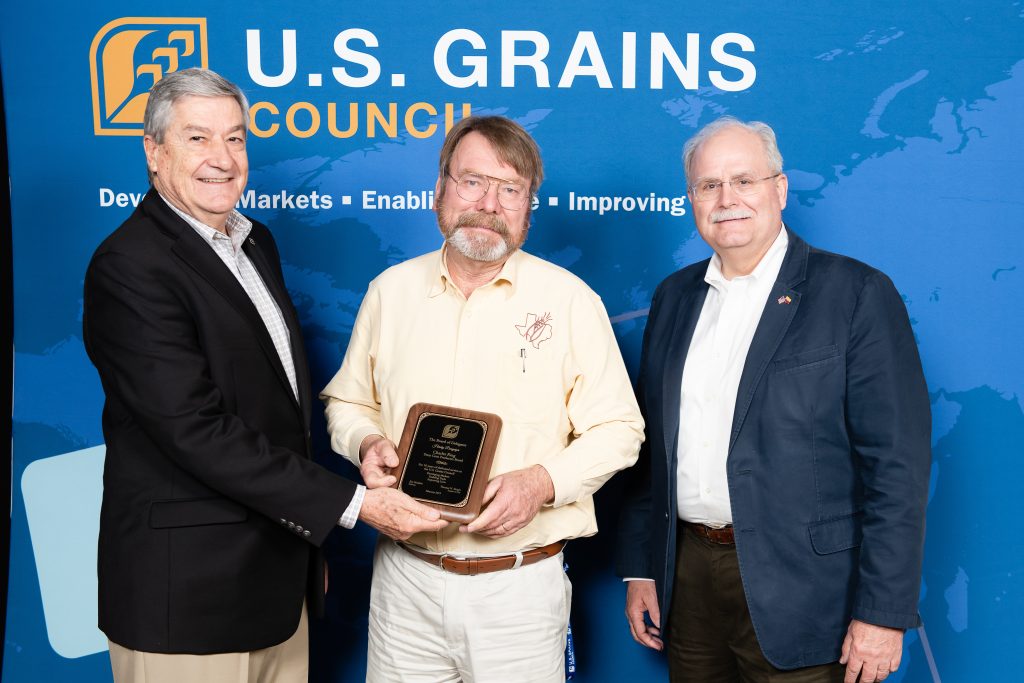In exchange for some Texas pralines, a Chinese trade team visiting Charles Ring’s farm gave him a piece of Chinese paper cutting art to hang in his shop window to filter out the bad luck and let in the good. A few months later, a hurricane blew through South Texas with the center hitting just 20 miles from Ring’s farm in Sinton.
“All the cotton was in the field and there wasn’t any damage in the yard, except for a few pieces of tin that blew off,” Ring said. “I came into the office to straighten things up. I pulled up that paper cutting and said, ‘By God, that thing works!’ It will hang here as long as I am here.”
Beyond lucky charms, Ring said the back-and-forth trade teams he has hosted for barbeques on his farm and the overseas missions he has participated in, organized by the U.S. Grains Council (USGC), are important components of building long-term relationships between U.S. farmers and overseas customers.
“Having them come to us and know us puts a little trust in the marketplace that is not going to be there otherwise,” Ring said. “The trade missions are important. If the opportunity arises, we need to go overseas, too, to see where the crop is going and have those interactions to develop trust and give them an idea of what kind of farm operations we have.”
Ring was first exposed to the value of the Council’s work when he entered a Texas agricultural leadership program at age 47. At the conclusion of the program, the group traveled to London and South Africa, Ring’s first trip outside the United States. Afterwards, he said he came home with a thirst for getting more involved in international markets.
Upon his return, Ring was approached about running for the Texas Corn Producers Board. After he was elected, his fellow farmers nominated him to travel to Japan and China with the Council. On that trip, he recalled talking with Japanese end-users about U.S. dried distiller’s grains with solubles (DDGS) – then a brand-new product for export – and working to establish trade for U.S. DDGS from the very start including education on how to transport, how to incorporate into a ration and more.
Ring became a USGC voting delegate in 2009 and served as the Asia Advisory Team leader for two years. Notably, he was elected to the USGC’s board of directors and served three terms, the last of which ended in 2017. The Council recognized Ring for 10 years of service during the organization’s 16th International Marketing Conference and 59th Annual Membership Meeting earlier this year.
“It became more obvious to me from where my position is in south Texas that what happens across the water is even more important for our grain,” Ring said. “Growing up, my daddy would go to the elevator and the price of corn was the same all day long. Now, it’s tick-by-tick when I sell corn – that’s a direct result of trade demand overseas.”
Exports are front-and-center to Ring’s farming operation in South Texas. He joked Texas is so big it takes him three plane trips to travel to Corn Board meetings in Lubbock or Amarillo, equal to the eight or nine hours required to drive the same distance. As a result, the logistics for hauling his south Texas corn favor the Mexican export market – the border is just two hours away – versus domestic destinations. Ring is also only 20 miles from Corpus Christi, and his sorghum in recent years had traveled directly to port for export to China. Since those exports to China dramatically declined, now he still has sorghum left in his bins.
“I haul grain sorghum to Corpus Christi directly from the farm and load it on the ship for China, so my basis is tremendous in comparison to sorghum growers in north Texas or Kansas,” Ring said. “Since that’s gone, we’re in pretty tough shape.”
Ring explained short crops due to drought in recent years helped buffer against the loss of the Chinese export market. But, the crops in the ground look good and a bumper harvest will be harder to market. While he is located ideally for corn and sorghum exports, Ring said the Council’s view of exports of grain in all forms – including meat and ethanol exports – is vital to keeping that grain moving off the farm. He looks forward to continuing to contribute his part to developing markets, enabling trade and improving lives.
“After that many years, I’m still learning,” Ring said. “When you quit learning, it’s time to quit, and I’m nowhere near that – at the farm or anywhere else.”
About The U.S. Grains Council
The U.S. Grains Council develops export markets for U.S. barley, corn, sorghum and related products including distiller’s dried grains with solubles (DDGS) and ethanol. With full-time presence in 28 locations, the Council operates programs in more than 50 countries and the European Union. The Council believes exports are vital to global economic development and to U.S. agriculture’s profitability. Detailed information about the Council and its programs is online at www.grains.org.

